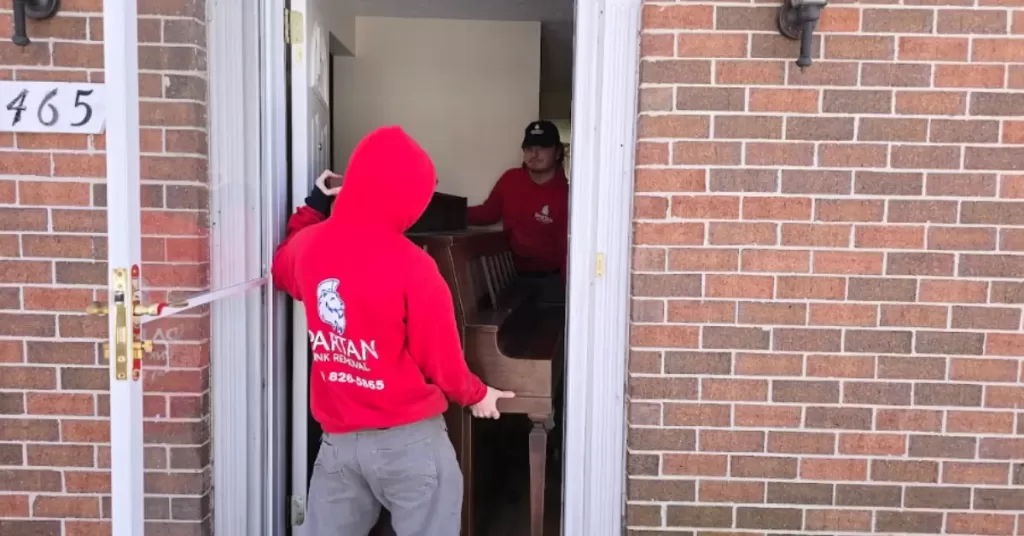Estate Cleanout Checklist: Key Steps for Handling an Estate Cleanout
Initiating estate cleanouts can often seem daunting, whether it’s due to the loss of a loved one, downsizing, or preparing a property for sale. This process includes sorting personal belongings and deciding what to keep, sell, donate, or throw away. It may also involve handling legal matters.
Making a checklist for an estate cleanout helps you stay organized and reduce stress. It helps you keep track of important steps and feel a sense of progress as you go through the cleanout.
In this article, we’ll walk you through the essential steps of an estate cleanout, offering practical tips and a comprehensive checklist to help you handle the process every step of the way. Whether you do it yourself or hire help, it will provide guidance and support.
Estate Cleanout Success Starts with Proper Planning
Before initiating any physical work, comprehensive and careful planning is essential. Planning ahead helps you avoid missing important items. It also reduces financial and emotional stress, making the cleanout process easier.
If you’re preparing for an estate sale, a clear strategy can help. It will improve your results and make the process easier.
A well-laid plan ensures that items are sorted into categories. If you want to keep antique pieces or sort unwanted items, planning is key. It helps make the process smooth. Whether you do it yourself or hire professionals, a good plan is essential.
It’s time to start handling personal matters and financial details. Taking care of these first will make the next steps easier.
1. Pre-Cleanout Considerations
Before starting the cleanout, think about key details that could affect the experience. Taking care of them first will make things smoother.
Emotional and Family Considerations
Cleaning out an estate can be emotionally difficult. It is especially hard after losing a loved one. Family members may struggle with complex dynamics. They often disagree on which items are sentimental and which can be given away.
- Empathy and Communication: Talking openly with family members sets clear expectations. This helps prevent conflicts and makes the process easier.
- Preserving Memories: Find ways to cherish meaningful items. You can make photo albums or save important documents on a computer.
- Support Systems: Consider professional counseling or mediation if disputes become overwhelming.
This stage is emotional as well as physical. It’s a personal process that takes time and care.
Financial and Tax Implications
Beyond the emotional aspects, there are practical financial considerations that must be addressed:
- Budgeting: Determine the overall cost of the cleanout, including potential fees for dumpster rental and junk removal services.
- Asset Appraisal: Ask an expert to check the value of important items. This will help you decide whether to sell or donate them.
- Tax Considerations: Be aware that selling items or making large donations may affect your taxes. It’s a good idea to check the rules or get advice.
After handling the emotional and financial aspects, handle all legal matters.
2. Legal Considerations
Handling the legal aspects of an estate cleanout is perhaps one of the most complex and essential parts of the process.
Following the Will and State Laws
The first legal obligation in any efficient estate cleanout process is to adhere to the deceased person’s will. This includes:
- Wills and Testaments: Check the will closely for any special instructions. Look for details about heirlooms and valuable items.
- State Laws: Make sure to follow local and state laws when handling the estate. This includes rules for distributing property and managing assets.
Settling Debts and Liabilities
Before any assets can be distributed or sold, outstanding debts must be addressed:
- Creditor Claims: Identify and settle any debts owed by the estate.
- Legal Liabilities: Talk to a financial expert to learn about possible taxes. They can also explain any legal responsibilities related to the estate.
Handling Sensitive Items
Some items may need special legal attention:
- Special Handling: Some items like old collectibles, important papers, and hazardous materials need special handling. This helps prevent legal problems.
- Documentation: Maintaining accurate records for each belonging ensures transparency and compliance with legal standards.
Importance of Legal Consultation
Estate matters often create challenges. Talking to a lawyer specializing in this area is a good idea.
- Expert Guidance: A lawyer can explain the rules for your state. This helps make sure the estate cleanout follows the law.
- Risk Mitigation: Good legal advice helps prevent problems. It can also settle disputes over valuable or unwanted items.
Once you handle the legal matters, you can start organizing. It’s time to sort through the estate’s belongings.
3. Security and Privacy
During the process, keep private information safe and protect the property.
- Access Control: Restrict access to areas with important documents and keepsakes.
- Data Protection: Save digital copies of key papers and use secure storage if needed.
- Physical Security: Use locks or security cameras if storing valuable items temporarily.
4. Organizing & Sorting the Estate
An organized approach to sorting the items in an estate is critical. A detailed checklist helps you keep track of everything. This makes the process easier and more organized.
Creating an Inventory
Begin by compiling a comprehensive inventory of all items present in the estate. This step is crucial for:
- Record Keeping: Documenting every belonging to track which items have been processed.
- Valuation: Figure out which items are valuable and need special care. This could include antiques or expensive modern items.
Identifying Valuable Items
A focused evaluation of valuable items is essential:
- Antiques and Collectibles: These items may require professional appraisal and careful handling.
- Jewelry and Heirlooms: Often hold both emotional and financial worth, necessitating extra care.
- Electronics and Designer Furniture: Decide whether to sell or throw away valuable modern items.
- Documentation: Keep all important documents for these items in a safe and easy-to-find place.
Categorizing Items
Once the inventory is complete, it’s time to sort the items into specific categories:
- To Keep: These include sentimental items and everyday belongings that family members wish to retain.
- To Sell: Items that hold market value and are in excellent shape should be set aside for sale.
- To Donate: Items in usable condition that no longer serve a purpose to the estate can be offered as a donation to charity.
- To Dispose: Clearly mark any unwanted items or those that are broken and need to be discarded.
Temporary Storage Solutions
In some cases, there may be a need to securely store items before they are sold, donated, or disposed of. Consider the following:
- Short-Term Storage: Utilize temporary storage facilities to keep items safe and organized.
- Climate Control: Ensure that items are kept in a good condition environment.
After sorting and organizing, shift your focus to more challenging items. Some may need special care or handling.
5. Handling Special Categories of Items
Some items in an estate need special care. This includes hazardous materials and other unique items. Proper handling ensures safety and compliance with regulations.

Bulky & Large Items
Oversized objects present unique challenges:
- Safe Handling: Plan for the safe moving of large items to prevent damage or injury.
- Professional Equipment: If there are many items, you may need to rent equipment or a dumpster.
- Storage and Removal: If you plan to sell or throw away items, keep records and use professional services if needed.
Specialized Items
Items that require a more nuanced approach include:
- Hazardous Materials: Most general disposal services do not handle hazardous items. Follow local rules for safe disposal. Label items correctly and take them to a proper facility.
- Batteries & Electronics: Recycle these items based on the manufacturer’s instructions. Throwing them away incorrectly can be harmful.
- Sensitive Documents: Keep important documents safe. Shred them or store them in a secure place.
6. Ensuring a Thorough Cleanout
Once specialized items have been managed, the focus shifts to thoroughly cleaning and preparing the space. Keeping the estate clean makes the final cleanup easier. It also helps with junk removal.
Debris Removal and Site Preparation
Start by clearing out any remaining debris and preparing the area for a deeper cleaning:
- Debris Removal: Remove all leftover trash, broken items, and any residues from the clean-out.
- Site Preparation: Ensure that all areas of the estate are accessible and clear, allowing for efficient movement during the cleaning process.
- Using the Right Tools: Gather necessary cleaning supplies to make the initial cleanup safe and effective.
Deep Cleaning and Restoration
Once the debris is cleared, perform a thorough cleaning of the entire space:
- Comprehensive Cleaning: Dust, vacuum, and sanitize all surfaces, paying special attention to corners and hidden areas that might have been overlooked.
- Restoration: Address any minor repairs or restoration tasks needed to return the estate to good condition.
- Attention to Detail: Ensure that all important documents and valuable or sentimental items are carefully removed from the cleaning area to avoid damage.
Final Inspection and Walk-Through
Conclude the clean-up phase with a final inspection:
- Checklist Review: Ensure every area has been addressed.
- Final Walk-Through: Conduct a thorough walk-through to confirm that no debris or unwanted residues remain.
- Documenting Results: Take photos or write notes to show the work is done. This can help in the future or when hiring a cleanout service.
With the space meticulously cleaned and prepped, it’s time to focus on disposing of items safely and responsibly.
7. Safe and Responsible Disposal Methods
Disposing of items correctly is a critical part of the estate cleanout process. Following best practices for safe and responsible disposal ensures that each belonging is handled appropriately. Begin by establishing clear guidelines for disposing of various types of items:
- Donate
- Sell
- Dispose
Handling Hazardous Materials & Electronics
Special care must be taken with items that can pose risks:
- Hazardous Materials: Follow specific disposal protocols for dangerous substances. Label these items clearly. Take them to a proper facility for safe disposal and to follow environmental rules.
- Electronics: Take old or broken electronics to a certified recycling center. This helps protect the environment.
- Legal Compliance: Adhere to local regulations to avoid any legal issues related to improper disposal.
Environmentally Friendly Practices
Choose methods that reduce harm to the environment. Reuse or recycle materials whenever possible. When disposing of items, consider the environmental impact:
- Recycling Programs: Recycle items such as batteries & electronics through certified recycling centers.
- Community Initiatives: Some local programs may offer collection services for hazardous waste.
8. Logistical Considerations
Logistics play a key role in a successful estate cleanout process. Proper planning and management of the timeline ensure a smooth and efficient operation.
Planning the Process and Timeline
Develop a phased approach to the clean-out that is realistic and manageable:
- Phased Approach: Split the estate cleanout checklist into clear steps. Finish each step before starting the next one
- Timeline Creation: Set clear milestones and deadlines to keep the process on track.
- Contingency Plans: Always have a backup plan in place in case unexpected issues arise.
9. Assistance from Professional Estate Cleanout Services
In many cases, using the help of experts can simplify the cleanout process significantly
When to Consider Professional Help
While some may opt for a DIY approach, there are clear indicators that professional assistance is warranted:
- Complex Estates: Big or cluttered estates may need professional help.
- Specialized Tasks: Tasks such as managing bulky or large items can be risky if not performed by professionals.
- Time Constraints: If you need to clear out items fast, a cleanout team can make the process easier.
Benefits of Hiring a Professional Service
Understanding the benefits of professional assistance is key:
- Expert Handling: Professional estate cleanout services have the skills to handle tough tasks. They know how to sort items accurately and ensure everything is handled with care.
- Efficiency and Safety: They use the right tools and methods to clear the estate fast and safely.
- Comprehensive Service: These experts manage everything from planning to cleanup, making the process easier and avoiding mistakes.
- Value Maximization: They can help you get the best value for valuable items and ensure that they are preserved appropriately.
Final Thoughts: Efficient & Smooth Estate Cleanout Process

This checklist gives you a clear plan for the estate cleanout. It covers everything from legal steps to sorting and organizing items.
You can clean out the estate yourself or hire professionals. Success depends on good planning, organization, and clear communication. If challenges arise, don’t hesitate to seek expert help to ensure a respectful and efficient transition.
Contact us today for our professional estate cleanout service to handle your unique needs and ensure a smooth transition.
Frequently Asked Questions
How Much Does It Cost To Have An Estate Cleaned Out?
Estate cleanout costs vary widely—from a few hundred to several thousand dollars—depending on the volume of items, the need for a professional cleanout, or additional services like dumpster rental.
How Long Do You Have To Clear A House After Someone Dies?
Timelines depend on state laws and the complexity of the estate cleanout. Typically, you have a few weeks to several months after a loved one’s passing. Knowing where to start by consulting legal guidelines is essential.
How Clean Does My House Need To Be When I Sell?
When cleaning out a home for sale, the property should be in pristine condition—free of debris and thoroughly cleaned—to ensure the property attracts buyers and offers peace of mind.
Who Is Responsible For Cleaning Up After A Death?
Usually, the executor or surviving family members manage the process, deciding what to keep and categorizing items. However, many don’t hesitate to consider professional assistance to ease the process and efficiently manage a loved one’s home cleanout.






